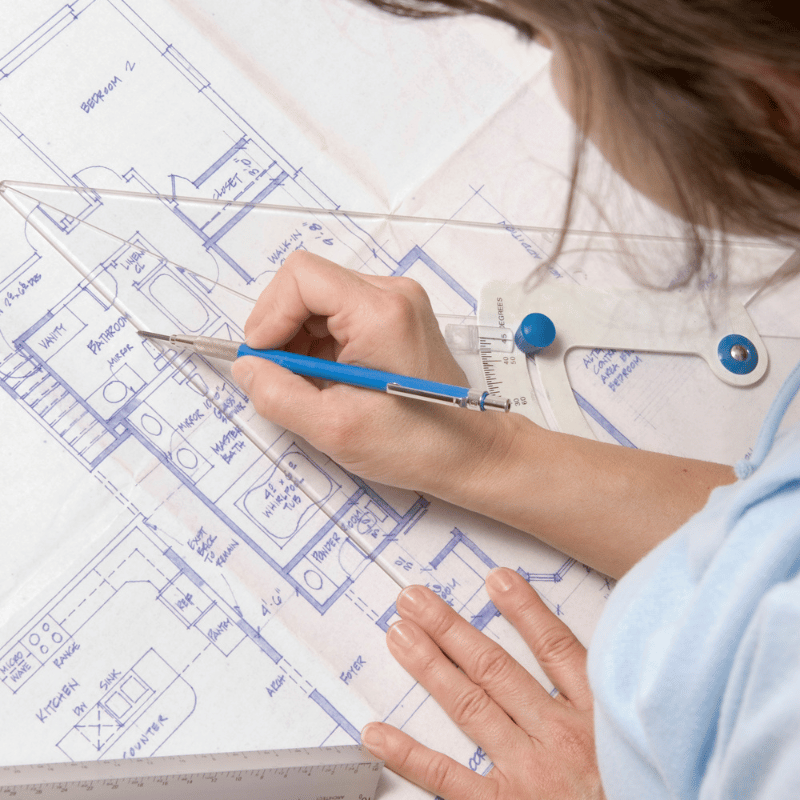Architect vs Architectural Designer: What’s the Difference in London?
Many People Confuse the Two – But the Difference Matters More Than You Think
In a busy, regulation-heavy city like London, the person you choose to design your space can have a huge impact on time, cost, planning success, and peace of mind. While the terms architect and architectural designer are often used interchangeably, they’re not the same job – and they don’t come with the same training, legal status, or accountability.
So how do you know which one you need for your project? Let’s break it down.
What Is an Architect?
In the UK, the title “architect” isn’t just a job label – it’s a protected legal designation. That means only people who have completed a rigorous, multi-stage education and registration process can call themselves one.
To become an architect, someone must:
- Complete 5+ years of formal architectural education (typically RIBA Part 1, 2 and 3)
- Work under supervision for a minimum of two years
- Pass a final qualifying exam (ARB recognised)
- Register with the Architects Registration Board (ARB)

Once qualified, they’re legally accountable for the quality and safety of the work they produce and are bound by a code of professional conduct.
In real terms, a London architect can:
- Design your project to a high standard
Guide you through complex planning approvals - Liaise with structural engineers, surveyors, and builders
- Ensure your designs meet strict local building and safety regulations
- Take responsibility for the full architectural process from concept to completion
You’re not just getting someone with design skills – you’re hiring a trained, regulated professional who understands how London works.
So What Is an Architectural Designer?
Unlike “architect,” the term “architectural designer” is not legally protected. Anyone can use it – whether they’ve studied design or not. That doesn’t mean all designers are unqualified or inexperienced, but it does mean you need to do your research.
Some architectural designers in London are highly skilled, with design degrees or technical drawing experience. Others may focus more on concept visuals, extensions, or interior space planning. Many work under architects or as part of wider building consultancy teams.
However, most cannot:
- Submit complex planning applications independently
- Sign off on technical or structural changes
- Be held legally accountable for architectural errors
- Offer the same level of assurance in insurance, contracts or regulation compliance

Real-World Example: London Planning Permission

Let’s say you’re converting a townhouse in Islington into flats.
You’ll need:
- Detailed elevation drawings
- A strong case for planning
- Understanding of daylighting, fire safety, and amenity space
- A knowledge of local planning constraints (heritage, Article 4 directions, etc.)
- Someone to speak with the council on your behalf
A registered architect has the training and professional standing to handle this. A designer may be able to support the visual and layout side of the project, but likely won’t have the credentials to see it through independently.
What About Costs?
Architectural designers often charge less than architects – which makes them appealing for simple home projects. If you just want to explore design ideas or visual layouts, that might be enough.
But cost shouldn’t be your only consideration. In London, where planning rules vary dramatically from one borough to the next, investing in an architect often saves time, money, and stress in the long run.
Mistakes in planning drawings, poor understanding of building regs, or lack of experience in dealing with structural issues can cause delays, refusals, or worse – costly construction errors that need fixing later.
Do You Always Need an Architect?
Not always.
If you’re redesigning a kitchen layout, making non-structural changes, or just want help with visualising ideas, an experienced designer may be the right fit.
But if you’re doing any of the following, you likely need an architect:
- Extensions (especially in conservation areas)
- Loft or basement conversions
- Listed building works
- Full-scale property redevelopments
- Commercial to residential conversions
- Projects involving structural change or multi-party approvals
Why It Matters in London
London is home to some of the UK’s toughest planning conditions. There are more than 30 boroughs, each with its own unique rules, conservation areas, and local planning authority quirks. Knowing how to navigate those systems isn’t just about design flair – it’s about understanding policy, negotiation, and risk management.
A qualified architect brings all of that experience to the table, while a designer may not.
How Freeson & Tee Can Help
At F&T, we offer the best of both worlds.
Our architectural team is led by ARB-registered architects, but we also work with experienced designers and technical consultants to deliver a collaborative, efficient, and cost-effective service.
We work on:
- High-end residential refurbishments
- Listed building upgrades
- Multi-unit developments
- Office-to-residential conversions
- Planning, design, and project management all under one roof

That means you get:
- Advice tailored to London borough requirements
- Clear, practical design options
- Strong project coordination between disciplines
- A team that can speak with your local authority and contractors directly
You don’t need to guess whether you need an architect or designer – we make sure you get the right support at the right time.
Final Thought: Choose the Right Person, Not Just the Right Title
Titles matter. But experience, accountability, and local knowledge matter even more. In London, where so many projects depend on tight planning policies, structural safety, and legal compliance, choosing a qualified professional can be the difference between success and setback.
If you’re not sure what your project needs, we’re happy to talk it through with no obligation.
If you would like to discuss more about construction consultants and contractors in London, please call our office on 020 7391 7100 or email us at surveyor@fandt.com.